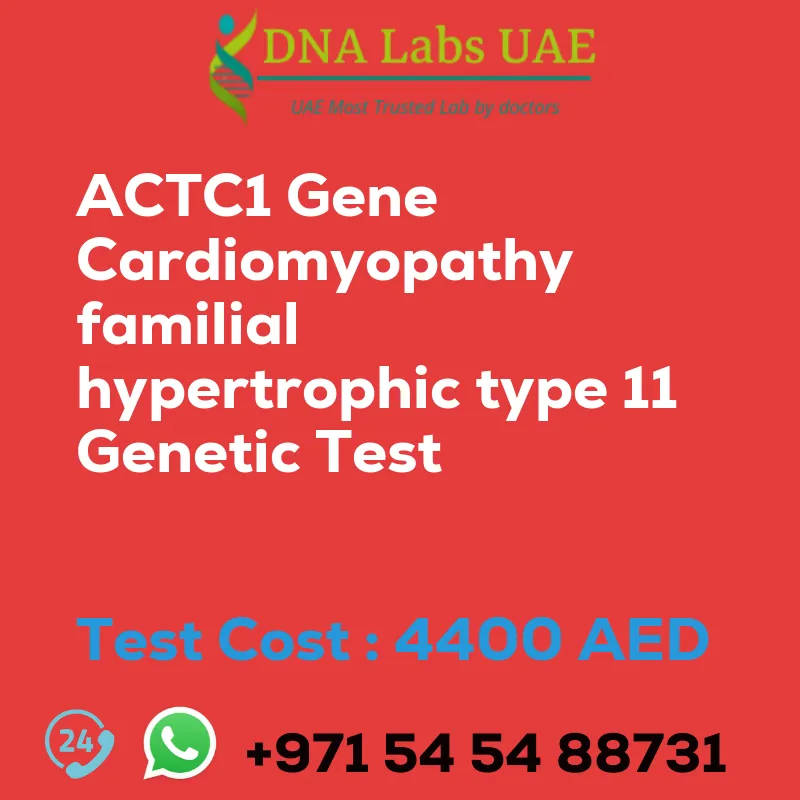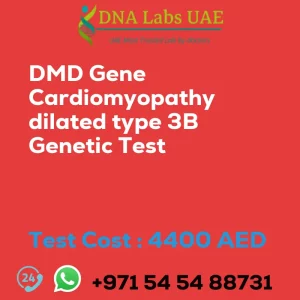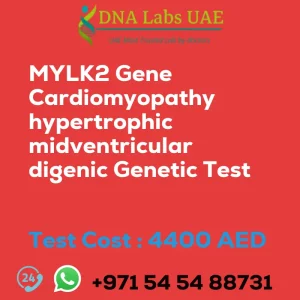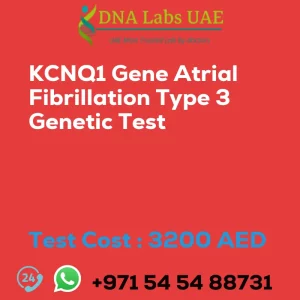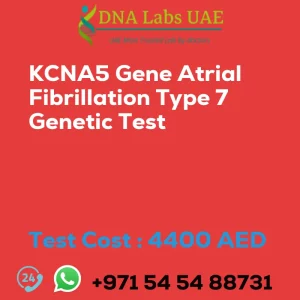ACTC1 Gene Cardiomyopathy Familial Hypertrophic Type 11 Genetic Test
Genetic testing plays a crucial role in diagnosing and understanding various genetic disorders. One such disorder is ACTC1 gene cardiomyopathy, familial hypertrophic type 11. This specific genetic disorder affects the heart muscle and is caused by mutations in the ACTC1 gene.
Test Details
The ACTC1 Gene Cardiomyopathy Familial Hypertrophic Type 11 Genetic Test is available at DNA Labs UAE. This test utilizes NGS (Next-Generation Sequencing) technology to analyze the DNA sequence of the ACTC1 gene. The test helps identify any mutations or variations in the gene that may be associated with the condition. The test components include:
- Test Name: ACTC1 Gene Cardiomyopathy Familial Hypertrophic Type 11 Genetic Test
- Price: 4400.0 AED
- Sample Condition: Blood
- Report Delivery: 3 to 4 Weeks
- Method: NGS Technology
- Test Type: Cardiovascular Pneumology Disorders
- Doctor: Cardiologist
- Test Department: Genetics
Symptoms and Diagnosis
Familial hypertrophic cardiomyopathy (FHC) refers to a group of diseases that affect the structure and function of the heart muscle. In the case of ACTC1 gene cardiomyopathy, familial hypertrophic type 11, the heart muscle becomes abnormally thickened, making it harder for the heart to pump blood effectively. Symptoms of this condition may include:
- Shortness of breath
- Chest pain
- Fatigue
- Fainting or dizziness
- Heart palpitations
Diagnosing ACTC1 gene cardiomyopathy, familial hypertrophic type 11 requires a genetic test, such as the ACTC1 Gene Cardiomyopathy Familial Hypertrophic Type 11 Genetic Test. It is important to consult with a healthcare professional or genetic counselor who can interpret the test results and provide appropriate recommendations.
Pre-Test Information
Before undergoing the ACTC1 Gene Cardiomyopathy Familial Hypertrophic Type 11 Genetic Test, it is recommended to provide the clinical history of the patient. Additionally, a genetic counseling session may be conducted to draw a pedigree chart of family members affected by the condition. This information helps in understanding the inheritance pattern and identifying potential carriers of the ACTC1 gene mutation.
Conclusion
The ACTC1 Gene Cardiomyopathy Familial Hypertrophic Type 11 Genetic Test offered by DNA Labs UAE is a valuable tool for diagnosing and understanding ACTC1 gene cardiomyopathy, familial hypertrophic type 11. It utilizes NGS technology to identify specific mutations in the ACTC1 gene that may be causing the condition. This information can assist in diagnosis, genetic counseling, and potentially guiding treatment decisions. It is essential to seek guidance from healthcare professionals or genetic counselors for the interpretation of test results and appropriate recommendations.
| Test Name | ACTC1 Gene Cardiomyopathy familial hypertrophic type 11 Genetic Test |
|---|---|
| Components | |
| Price | 4400.0 AED |
| Sample Condition | Blood |
| Report Delivery | 3 to 4 Weeks |
| Method | NGS Technology |
| Test type | Cardiovascular Pneumology Disorders |
| Doctor | Cardiologist |
| Test Department: | Genetics |
| Pre Test Information | Clinical History of Patient who is going for ACTC1 Gene Cardiomyopathy, familial hypertrophic type 11 NGS Genetic DNA Test. A Genetic Counselling session to draw a pedigree chart of family members affected with ACTC1 Gene Cardiomyopathy, familial hypertrophic type 11 NGS Genetic DNA Test gene ACTC1 |
| Test Details | ACTC1 gene cardiomyopathy, familial hypertrophic type 11 is a specific type of genetic disorder that affects the heart muscle. It is caused by mutations in the ACTC1 gene, which provides instructions for making a protein called cardiac alpha-actin. Cardiomyopathy refers to a group of diseases that affect the structure and function of the heart muscle. In familial hypertrophic cardiomyopathy (FHC), the heart muscle becomes abnormally thickened, making it harder for the heart to pump blood effectively. NGS (Next-Generation Sequencing) genetic testing is a type of genetic test that can analyze multiple genes simultaneously. It uses advanced sequencing technology to examine the DNA sequence of specific genes, such as the ACTC1 gene, to identify any mutations or variations that may be associated with a particular condition. In the case of ACTC1 gene cardiomyopathy, familial hypertrophic type 11, NGS genetic testing can help identify specific mutations in the ACTC1 gene that may be causing the condition. This information can be used for diagnosis, genetic counseling, and potentially guiding treatment decisions. It’s important to note that genetic testing should be done under the guidance of a healthcare professional or genetic counselor who can interpret the results and provide appropriate recommendations. |

